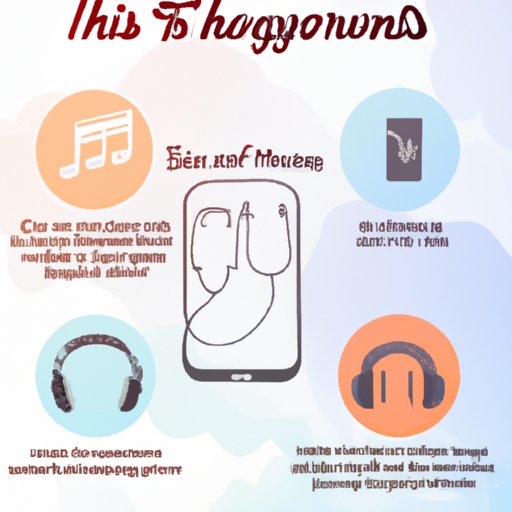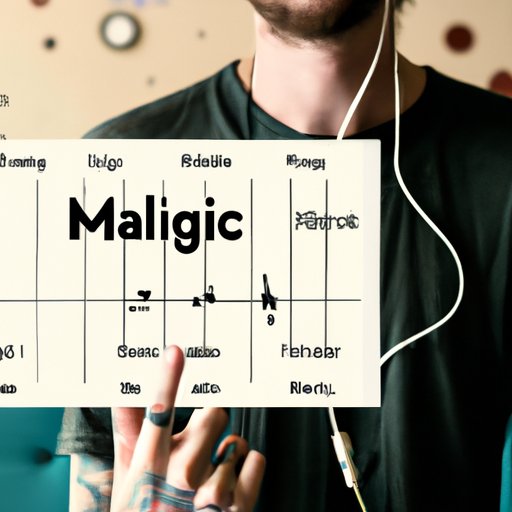Introduction
Music is an important part of life that can be enjoyed in many ways. Whether it’s listening to the radio, attending a live concert, or playing an instrument, music can have a powerful impact on our lives. But with so many types of music out there, it can be difficult to know what kind of music you should be listening to. In this article, we’ll explore the various genres of music, their characteristics, and how they can influence your mood and creativity.
Exploring Different Genres of Music: What Type of Music Should You Listen To?
The first step in finding the right music for you is to understand the different genres of music. Popular genres include rock, pop, hip-hop, country, folk, jazz, classical, and electronic. Each genre has its own unique characteristics that make it distinctive. For example, rock music is often characterized by loud guitars and drums, while pop music typically has upbeat melodies and catchy lyrics. Hip-hop is known for its use of sampling and rapping, and country music is often rooted in storytelling and nostalgia.
In addition to these popular genres, there are also other types of music such as instrumental or world music. Instrumental music is composed without any vocals or lyrics, while world music incorporates elements from different cultures and countries. Both styles can be incredibly powerful and moving, and can provide a welcome change of pace from more traditional genres.
If you’re looking to find new music, there are plenty of resources out there. Streaming services like Spotify, Apple Music, and YouTube Music offer millions of songs from all genres, and can help you discover new artists and songs. Social media platforms like Instagram and Twitter are also great places to find new music. Follow your favorite artists to stay up to date on their latest releases, and explore hashtags related to the type of music you’re interested in to find new music.

The Benefits of Listening to Different Types of Music
Listening to different types of music can have a number of positive benefits. One of the most common is that it can enhance creativity. Studies have shown that listening to music can help people come up with new ideas and solve problems more quickly. This can be especially helpful when working on creative projects such as writing, painting, or designing.
Music can also help reduce stress and anxiety. Listening to calming music can help lower blood pressure and heart rate, while upbeat music can boost energy levels and improve mood. Music can also be used to help focus and concentrate, which can be especially helpful when studying or completing a task.
How to Find the Right Music for Your Mood
It’s important to understand your current emotional state before choosing music to listen to. If you’re feeling anxious or stressed, opt for slower, more calming music such as classical or ambient. If you’re feeling low energy, try something more upbeat like pop or hip-hop. If you’re feeling creative, experiment with instrumental music or world music.
Once you’ve identified the type of music that best suits your mood, you can start exploring different artists and songs within that genre. There are plenty of online resources that can help you find new music, such as streaming services and social media platforms. Additionally, take some time to read reviews and listen to samples to ensure you’re finding the right music for your mood.
Finally, don’t be afraid to make adjustments if necessary. If the music isn’t doing its job, try something else. Don’t be afraid to experiment and explore different types of music until you find something that works for you.
Exploring Music Through the Decades
Exploring music through the decades is a great way to gain an appreciation for different genres and eras of music. Take some time to listen to classic songs from each decade, such as The Beatles’ “Let It Be” from the 1960s or Nirvana’s “Smells Like Teen Spirit” from the 1990s. As you do, consider how the music reflects the cultural and political climate of the time, and think about the impact it had on society.

Understanding the Effects of Music on Emotions
Different types of music can have different effects on our emotions. Studies have shown that fast-paced music can make us feel energized and motivated, while slower music can make us feel relaxed and calm. Music can also evoke certain memories or feelings, depending on the context. For example, a certain song may remind you of a special moment in your life.
Various factors can affect the impact of music on our emotions. These include the tempo, volume, and complexity of the music, as well as our individual preferences and experiences. As you explore different types of music, pay attention to how it makes you feel and adjust accordingly.

Matching Music to Your Personality
Another great way to find the right music for you is to match it to your personality. Start by identifying your personality type. Do you consider yourself an introvert or extrovert? Are you more analytical or creative? Once you’ve identified your personality type, look for music that fits your traits. For example, if you’re an introvert, you might enjoy more mellow music like jazz or classical. If you’re analytical, you might be drawn to more complex music like progressive metal or EDM.
Conclusion
Finding the right music can be a great way to express yourself and enhance your mood. In this article, we explored the different genres of music, their characteristics, and how they can influence our emotions. We also discussed tips for finding the right music for your mood and personality. Ultimately, the key is to explore different types of music and find what works for you.
(Note: Is this article not meeting your expectations? Do you have knowledge or insights to share? Unlock new opportunities and expand your reach by joining our authors team. Click Registration to join us and share your expertise with our readers.)
